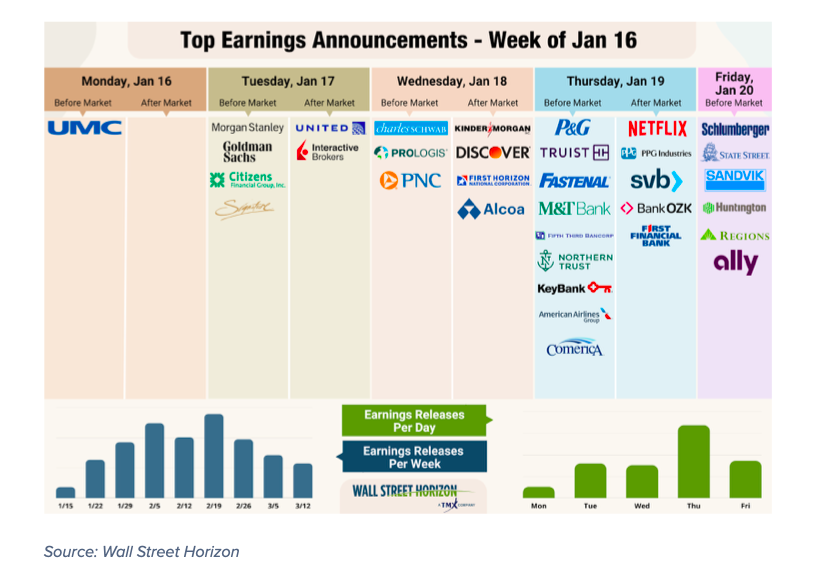Corporate Earnings: Why The Good Times Might Not Last

Table of Contents
The Impact of Inflation and Rising Interest Rates
High inflation and rising interest rates pose significant threats to corporate profitability and sustainable growth. These macroeconomic factors directly impact companies' ability to maintain and grow their earnings.
-
High inflation erodes profit margins: Increased costs for raw materials, labor, energy, and transportation directly eat into profit margins. Companies struggle to pass these increased costs onto consumers, leading to squeezed profitability. For example, the manufacturing sector has witnessed significant increases in input costs, reducing overall margins despite strong sales.
-
Rising interest rates increase borrowing costs: Higher interest rates make borrowing more expensive, impacting companies' expansion plans and potentially leading to decreased investment in research and development, capital expenditures, and hiring. This is particularly true for companies with significant debt levels.
-
Monetary policy tightening impacts corporate lending: The Federal Reserve's actions to combat inflation, such as raising interest rates, directly impacts the availability and cost of credit for corporations. This tightening of monetary policy can slow down economic activity and reduce corporate investment.
-
High debt burdens exacerbate vulnerability: Companies with substantial debt are particularly vulnerable to rising interest rates. Increased interest payments reduce profitability and can even threaten their solvency if they are unable to manage their debt effectively. This impacts their future earnings potential significantly.
Weakening Consumer Demand and Supply Chain Disruptions
The confluence of weakening consumer demand and persistent supply chain disruptions further threatens the sustainability of strong corporate earnings.
-
Decreased consumer spending: Inflation and economic uncertainty are leading to decreased consumer spending. Consumers are becoming more cautious with their purchases, prioritizing essential goods and services. This reduced demand directly impacts sales and revenue for many companies.
-
Persistent supply chain disruptions: Global supply chains remain fragile, leading to increased production costs and inventory shortages. Geopolitical instability and unforeseen events continue to disrupt the flow of goods, causing delays and increasing costs for businesses.
-
Geopolitical instability adds further uncertainty: The ongoing war in Ukraine, along with other geopolitical tensions, adds to the uncertainty in global markets. These factors create volatility in energy prices and raw material costs, impacting corporate earnings across multiple sectors.
-
Recessionary risks loom large: The possibility of a recession further exacerbates concerns. A recession would likely lead to a sharp drop in consumer demand, significantly impacting corporate earnings across various sectors. This decreased demand might lead to significant inventory write-downs and reduced profitability.
Geopolitical Risks and Global Economic Uncertainty
Geopolitical risks and global economic uncertainty are contributing to an environment where strong corporate earnings may prove unsustainable.
-
The war in Ukraine and its global impact: The ongoing conflict in Ukraine has created significant uncertainty in global markets, impacting energy prices, commodity markets, and global trade. This instability affects the entire global economic landscape.
-
Energy price volatility and potential shortages: Volatility in energy prices and the potential for shortages significantly impact production costs for many industries. Companies are struggling to manage these unpredictable expenses.
-
International sanctions and trade disputes: International sanctions and trade disputes further complicate global supply chains and increase costs. These disruptions can negatively affect a company's ability to source materials and distribute products.
-
Political instability amplifies risks: Political instability in various regions adds to the overall uncertainty and can significantly affect corporate operations and investments. This uncertainty can make long-term planning and financial forecasting extremely difficult.
Overvalued Stock Market and Investor Sentiment
Current stock market valuations, in light of the above factors, may not accurately reflect the underlying economic risks.
-
Stock market valuations may be inflated: The current levels of stock prices might not reflect the potential challenges posed by inflation, interest rate hikes, and weakening economic growth.
-
A shift in investor sentiment could trigger a market correction: A change in investor sentiment, triggered by disappointing earnings reports or worsening economic data, could lead to a significant market correction, negatively impacting corporate valuations and investor confidence.
-
Risk assessment is crucial for investors: Investors need to carefully assess the risks associated with current corporate earnings and adjust their portfolios accordingly. A proactive and informed approach is crucial for navigating the complexities of the current economic environment.
Conclusion
While recent corporate earnings have been strong, several factors suggest this trend may not be sustainable. Inflation, rising interest rates, weakening consumer demand, supply chain disruptions, and geopolitical risks all pose significant threats to future profitability. Understanding these challenges is crucial for investors. Stay informed about upcoming corporate earnings reports, carefully analyze the underlying economic conditions, and adjust your investment strategies accordingly to navigate the complexities of the current economic climate and mitigate potential risks related to corporate earnings. Stay updated on the latest news and analysis surrounding corporate earnings to make informed investment decisions and ensure the long-term health of your portfolio.

Featured Posts
-
 Virginia Health Officials Address Second Measles Case Of 2025
May 30, 2025
Virginia Health Officials Address Second Measles Case Of 2025
May 30, 2025 -
 Late Term Clemency Trump Grants Forgiveness To 26 Individuals
May 30, 2025
Late Term Clemency Trump Grants Forgiveness To 26 Individuals
May 30, 2025 -
 Iowa High School Track And Field State Meet Results May 22 25
May 30, 2025
Iowa High School Track And Field State Meet Results May 22 25
May 30, 2025 -
 Popeye Film Set Barry Dillers Allegations Of Widespread Cocaine Use
May 30, 2025
Popeye Film Set Barry Dillers Allegations Of Widespread Cocaine Use
May 30, 2025 -
 Elon Musks Alleged Paternity New Twins And The Amber Heard Connection
May 30, 2025
Elon Musks Alleged Paternity New Twins And The Amber Heard Connection
May 30, 2025
